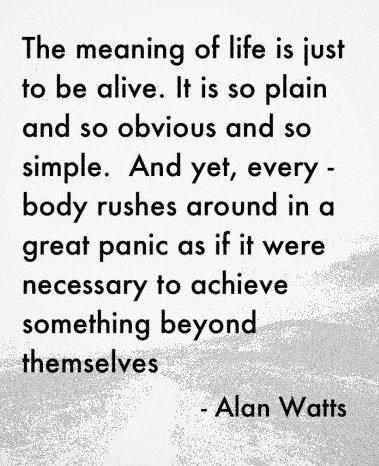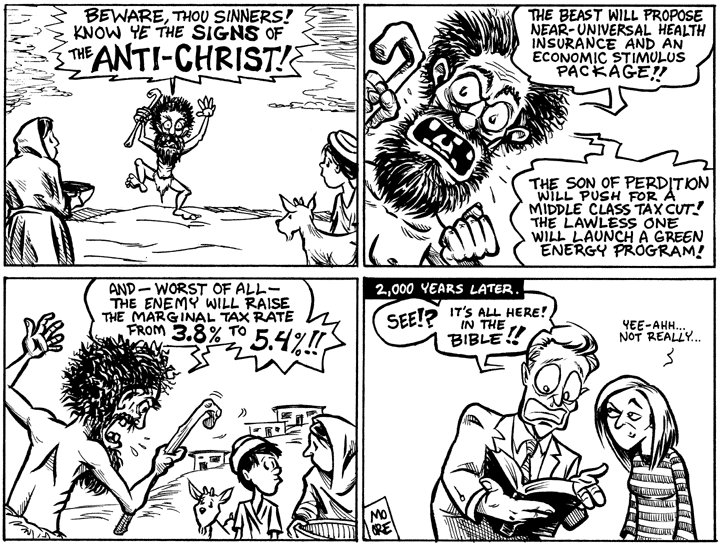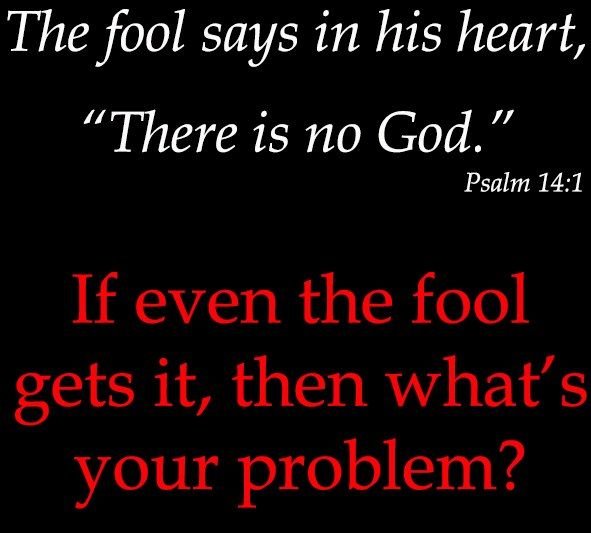
Evangelicals believe that it is God and the salvation they find in Jesus that give life meaning and value. I have had numerous Christians tell me that they would kill themselves if this life was all that there is. Paul echoed this thinking in 1 Corinthians 15:17-19 when he said:
For if the dead rise not, then is not Christ raised: And if Christ be not raised, your faith is vain; ye are yet in your sins. Then they also which are fallen asleep in Christ are perished. If in this life only we have hope in Christ, we are of all men most miserable.
For Evangelicals, life without Jesus is miserable, one not worth living. The sum of their existence is wrapped up in believing that God has a super-duper, awesome, wonderful plan for their lives and that there is coming a day when he will reward them for obediently sticking to the plan. Life is viewed as preparation to meet God after death. The goal is the divine payoff that awaits them in the sweet-by-and-by. Or so the official press release says, anyway.
Paying attention to how Evangelicals actually lives their lives tells a far different story. If life is all about God, you would think Evangelicals would spend their waking hours worshiping Jesus, praying, studying the Bible, and doing everything in their power to evangelize the unwashed, uncircumcised Philistines of the world. If life is all about J-E-S-U-S, you would think Evangelical churches would have worship services every day of the week and twice on Sunday. If, as Evangelicals say, the second coming of Jesus is nigh, shouldn’t Evangelicals be about their Father’s business, working diligently, for their redemption draweth nigh?
What we find instead is that Evangelicals live lives no different from those of their non-Christian neighbors. I have been told countless times by Christian zealots that my life as an atheist has no meaning or purpose. I am just biding my time, living out a miserable existence until I die. However, when I carefully examine how Evangelicals live their lives, I quickly see that their wants, needs, and desires are no different from mine. I can’t help but notice that Evangelical homes have all the material trappings their unsaved neighbors have. It seems that Evangelicals have forgotten what the Bible says about loving the world and craving its goods and pleasures. Just yesterday, I perused the Facebook page of an Evangelical who loves posting Christian memes. And then, smack dab in the middle of his wall was a post about him looking forward to attending a KISS concert! Oh, the irony, but that’s Evangelicalism to its core. The followers of Jesus talk a good line, but when it comes down to practicing what they preach, well they are no different from atheists, humanists, agnostics and other heathens who supposedly have empty, meaningless lives.
How about we agree that all of us — saint and sinner — find meaning and value in the same things; that all of us seek love and social connection; that all us crave to feel wanted and needed; that all of us enjoy the pleasures this life has to offer; that all us desire peace, comfort, and prosperity. No God needed. The fact that we are alive — think about THAT for a moment — is enough to fuel our quest for purpose and meaning. One need not turn to religion to find these things. All any of us needs to do is take a deep breath and LIVE!
Here are a few quotes from the book, A Better Life:100 Atheists Speak Out on Joy and Meaning in a World without God:
“I look around the world and see so many wonderful things that I love and enjoy and benefit from, whether it’s art or music or clothing or food and all the rest. And I’d like to add a little to that goodness.” — Daniel Dennett
“I thrive on maintaining a simple awe about the universe. No matter what struggles we are going through the miracles of existence continue on, forming and reforming patterns like an unstoppable kaleidoscope.” — Marlene Winell
“Math . . . music . . . starry nights . . . These are secular ways of achieving transcendence, of feeling lifted into a grand perspective. It’s a sense of being awed by existence that almost obliterates the self. Religious people think of it as an essentially religious experience but it’s not. It’s an essentially human experience.” — Rebecca Newberger Goldstein
“There is joy in the search for knowledge about the universe in all its manifestations.” — Janet Asimov
“Science and reason liberate us from the shackles of superstition by offering us a framework for understanding our shared humanity. Ultimately, we all have the capacity to treasure life and enrich the world in incalculable ways.” — Gad Saad
“If you trace back all those links in the chain that had to be in place for me to be here, the laws of probability maintain that my very existence is miraculous. But then after however many decades, less than a hundred years, they disburse and I cease to be. So while they’re all congregated and coordinated to make me, then—and I speak her on behalf of all those trillions of atoms—I should really make the most of things.” — Jim Al-Khalili
You can read other powerful quotes here.
I know that I am in the waning years of life. My body is telling me that time is short, and it could be shorter yet if I have another fall like I did last week at my in-law’s home: full body slam, face first on a cement floor. The good news is that I saved my phone from getting broke! Talk about things that matter, right? I know that osteoarthritis continues to eat away at my spine. I was in college — a slim, trim, fit young whippersnapper — when I first consulted a doctor for my back. I have narrow disc spaces in my lower back, and age and arthritis continue to lessen that space, causing nerve compression. Several weeks ago, I saw my orthopedic doctor about a problem I was having with my right hip. I would stand up and start to move and then, all of a sudden my hip would give way and I would fall. After careful examination, my doctor told me my hip was fine; that it was my lower back that was causing the problem. Any one of these falls could do me in. I know that, and I do all I can to avoid hitting the deck. Try as I might to push back against the ravages of time and physical debility, I know, in the end, they will win. They ALWAYS win. Knowing this helps me focus on the things that really matter to me
Let me conclude this post with several quotes from an article by Tom Chivers titled, I Asked Atheists How They Find Meaning In A Purposeless Universe:
“The way I find meaning is the way that most people find meaning, even religious ones, which is to get pleasure and significance from your job, from your loved ones, from your avocation, art, literature, music. People like me don’t worry about what it’s all about in a cosmic sense, because we know it isn’t about anything. It’s what we make of this transitory existence that matters.
“If you’re an atheist and an evolutionary biologist, what you think is, I’m lucky to have these 80-odd years: How can I make the most of my existence here? Being an atheist means coming to grips with reality. And the reality is twofold. We’re going to die as individuals, and the whole of humanity, unless we find a way to colonise other planets, is going to go extinct. So there’s lots of things that we have to deal with that we don’t like. We just come to grips with the reality. Life is the result of natural selection, and death is the result of natural selection. We are evolved in such a way that death is almost inevitable. So you just deal with it.
“It says in the Bible that, ‘When I was a child I played with childish things, and when I became a man I put away those childish things.’ And one of those childish things is the superstition that there’s a higher purpose. Christopher Hitchens said it’s time to move beyond the mewling childhood of our species and deal with reality as it is, and that’s what we have to do.” — Jerry Coyne
“Life is a series of experiences, and the journey, rather than the end game, is what I live for. I know where it ends; that’s inevitable, so why not just make it a fun journey? I am surrounded by friends and family, and having a positive effect on them makes me happy, while giving my kids the opportunity, skills, and empathy to enjoy their lives gives me an immediate sense of purpose on a daily basis. I can’t stop the inevitable so I’ll just enjoy what life I have got, while I’ve got it. I won’t, after all, be around to regret that it was all for nothing. ” — Simon Coldham
“It’s honestly never bothered me. I suppose that’s because my definitions of ‘meaning’ and ‘purpose’ are pretty thoroughly rooted in the world I know. I know what happiness is, and love, and fulfilment and all that; these things exist (intermittently) in my short earthly life, and it’s from these things I derive my ideas of what a meaningful, purposeful existence is.
“I am, like anyone, staggered when I consider my tininess in the multi-dimensional scheme of things, but – and I know this sounds a bit silly – I don’t really take it personally. Meaning has to be subjective; atheism actually makes it easier to live with this, as who is better placed than me to judge the meaningfulness of my work, or my relationship, or my piece of buttered toast?” — Richard Symth
“People ask how you can find any meaning in life when you know that one day you’ll be dead and in due course nothing of you will survive at all – not even people’s memories. This question has never made sense to me. When I’m reading a good book, or eating a good meal, or taking a scenic walk, or enjoying an evening with friends, or having sex, I don’t spend the whole time thinking, Oh no! This book won’t last forever; this food will be gone soon; my walk will stop; my evening will end! I enjoy the experiences. Although it’s stretched out over a (hopefully) much longer time, that’s the same way I think about life. We are here, we are alive. We can either choose to end that, or to embrace it and to live for as long as we can, as fully and richly as possible.
“Obviously this means that we all have different meanings in our lives, things that give us pleasure and purpose. The most meaningful experiences in my life have been relationships with people – friends and family, colleagues and classmates. I love connecting with other people and finding out more about them. I enjoy the novels and histories that I read for the same reason and I like to feel connected to the people who have gone before us. I hope that the work I do in different areas of my life will make the world a better place for people now and in the future, and I feel connected to those future people too, all as part of a bigger human story.” — Adam Copson
You can read other wonderful meaningless quotes here.
About Bruce Gerencser
Bruce Gerencser, 61, lives in rural Northwest Ohio with his wife of 40 years. He and his wife have six grown children and twelve grandchildren. Bruce pastored Evangelical churches for twenty-five years in Ohio, Texas, and Michigan. Bruce left the ministry in 2005, and in 2008 he left Christianity. Bruce is now a humanist and an atheist. For more information about Bruce, please read the About page.
Bruce is a local photography business owner, operating Defiance County Photo out of his home. If you live in Northwest Ohio and would like to hire Bruce, please email him.
Thank you for reading this post. Please share your thoughts in the comment section. If you are a first-time commenter, please read the commenting policy before wowing readers with your words. All first-time comments are moderated. If you would like to contact Bruce directly, please use the contact form to do so.
Donations are always appreciated. Donations on a monthly basis can be made through Patreon. One-time donations can be made through PayPal
Share This Post On Social Media:








 I believe there can be no more important question than “Who is God?” because even among believers in God have so many different “pictures” of God in their minds. And every mental image of God has consequences for everyday life. Did you know that Hitler believed in God? He absolutely did. When he narrowly escaped death from a bomb planted near him by a conspirator he frequently attributed his survival to God. He saw his narrow escape from assassination as proof that God was with him and on his side.
I believe there can be no more important question than “Who is God?” because even among believers in God have so many different “pictures” of God in their minds. And every mental image of God has consequences for everyday life. Did you know that Hitler believed in God? He absolutely did. When he narrowly escaped death from a bomb planted near him by a conspirator he frequently attributed his survival to God. He saw his narrow escape from assassination as proof that God was with him and on his side.

